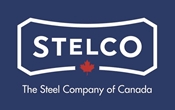Canada

February 21, 2019
Stelco Defies Tariffs with Strong Profits
Written by Sandy Williams
Canadian steel company Stelco announced a new CEO and defied U.S. tariffs with a strong earnings report for the fourth quarter.
David Cheney, formerly chief business development officer, will assume the mantle of CEO from Alan Kestenbaum who will continue to serve as Executive Chairman. Cheney will have executive responsibility for the company’s day-to-day business, while Kestenbaum will focus on corporate strategy and growth. The change was effective Feb. 20, 2019.
“David’s appointment recognizes his strong leadership role since Bedrock acquired the company,” said Kestenbaum. “We have worked together very closely for several years and David has earned my full confidence and that of the Board of Directors and management, and I am proud to transition the role of CEO of the company to him. This transition will allow me to continue to oversee all aspects of the company while allowing me more time to focus on driving the company’s strategy and growth initiatives. Stelco has delivered very strong results since our acquisition, and I am very confident that this executive change will bring even stronger results and accelerated growth.”
Kestenbaum added that the company is ready for a growth phase and that there are increasing opportunities for mergers and acquisitions.
A 14 percent year-over-year jump in shipping volumes and a 28 percent hike in average steel selling prices resulted in revenue of CA $648 million (U.S. $491 million) in the fourth quarter. Net income for the quarter was CA $108 million (U.S. $82 million)
By focusing on domestic sales, Stelco reduced tariff-related costs by 41 percent from the third quarter to CA $23 million in Q4.
“We are continuing with efforts to reduce our tariff exposure into 2019 and fully support the Canadian government’s efforts to eliminate the 232 tariffs against Canadian steel,” said Kestenbaum.
Kestenbaum remarked that the Canadian steel industry has not seen the same degree of price decline as in the United States. “What you’ve seen in the U.S. market has been a very significant decline. We have not seen that type of declining in Canada. A lot of that has to do with the very effective countermeasures that the Canadian government imposed.”
“We did see some decline in Q4, and as we get to Q1 we’re starting to see as a lot of the very positive things going on in the market, whether its cost push, the strong demand, etc., pricing started to go up. Our lag is closer to one month…but, importantly, the delta between the Canadian market and the U.S. market has shrunk significantly as a result of the U.S. market declining more precipitously and rapidly,” he said.
Stelco has upgraded its hot strip mill and galvanizing line to meet the needs of the automotive industry. “This year we had a significant increase, albeit starting off a low base, in sales to the auto sector,” said Kestenbaum. “We’ve captured markets from some of the U.S. suppliers that are forced to retreat from this market because of the countermeasures of the duties.”
Kestenbaum added, “We had planned already for a while, even before the tariffs came into being, that this company, which had become a predominantly hot-rolled producer, was going to change its product mix in order to recapture part of the market we had lost, specifically in the auto sector. We also identified that the market here really did not have ample supply of annealed cold-rolled coil. We were making full hard cold-rolled; we did not have the capability to make annealed, which is basically different tempers that give the material more properties and many more diverse applications.”
“So, our sales into the auto sector both in hot-rolled coil as well as galvanized is going to be increasing. You will see a mix there, which is higher value-added product. And then the cold-rolled, which we expect to get up in the initial phase to about 200,000 tons, was completely nonexistent before. “
The shift in product mix will have a double benefit: reduction in tariffs paid and a higher market share of value-added products, the company said.
Stelco plans to revitalize its coke-making assets to increase coke production. “In the second half of 2019 and the first half of 2020, we’ll be initiating a capital project to rejuvenate a number of our coke ovens. We’ll still have adequate coke to meet our internal needs, but we may have less excess coke-related products for sale to third parties in 2019 than we had in 2018. Following the rejuvenation of the coke facilities, we’ll have even more coke for sale starting next year than we had in 2018.”
In 2018, the company shipped 200,000 tons of merchant coke. The upgrades will boost that amount to 300,000 tons for shipment or use internally.
A recent press release from the United Steelworkers announced the reopening of the Point-Noire iron ore pellet facility. Kestenbaum acknowledged the union’s press release but declined to comment further.






